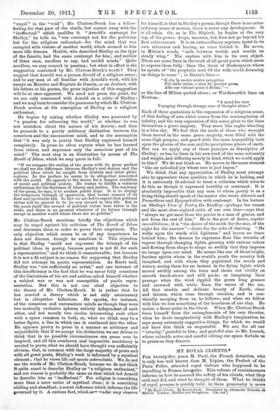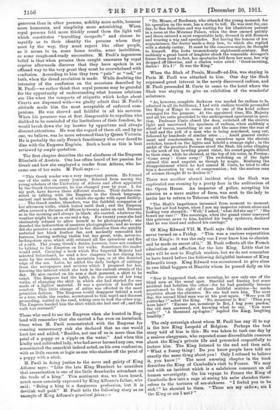MY ROYAL CLIENTS.*
FOB twenty-five years M. Paoli, the French detective, who is only less well known than M. Lepine, the Prefect of the Paris Police, attended royal visitors who happened to be travelling in France incognito. This volume of reminiscences informs us how he assured the safety of his clients, what they said and did, and what he thought of them. What he thinks of royal persons is quickly told : in them generosity is more • my Royal Clients. By Xavier Paoli. Translated by Alexander Teixeira de Matto'. London : Hodder and Stoughton. [12e. net.]
generous than in other persons, nobility more noble, humour more humorous, and simplicity more astonishing. When royal persons fold more thickly round them the light veil
which constitutes "travelling incognito" and choose to mystify as to their identity the persons whom they
meet by the way, they must expect like other people, as it seems to us, some home truths, some incivilities, or some rough-and-ready encounters. M. Paoli's ingenuous belief is that when persons thus caught unawares by royal caprice afterwards discover that they have spoken in an offhand way to the very great they must be overwhelmed with confusion. According to him they turn "pale" or "red," or both, when the dread revelation is made. While doubting the intensity of the confusion on the occasions described by M. Paoli—we rather think that royal persons may be grateful for the opportunity of understanding what human relations are like when the ramparts of etiquette which hedge about Courts are dispensed with—we gladly admit that M. Paoli's attitude made him the most acceptable of enforced com- panions. He was shrewd and faithful in all his services.
When his presence was at first disagreeable to royalties who disliked to be reminded of the limitations of their freedom, he would break down the icy barrier by opportune and always discreet attentions. He won the regard of them all, and by no one, we believe, was he more esteemed than by Queen Victoria. He is probably the only French functionary who ever dared to dine with the Empress Eugenie. Such a book as this is best reviewed by ample quotation.
The first chapter describes the sad aloofness of the Empress Elisabeth of Austria. One has often heard of her passion for Greek and how she employed a reader from Athens, who be- came one of her suite. M. Paoli says :—
" This Greek reader was a very important person. He formed one of the suite on every journey. Selected from among the young scholars of the University of Athens and often appointed by the Greek Government, he was changed year by year. I, for my part, have known three different readers. Their duties con- sisted in talking with the Empress in the Greek language, ancient and modern, both of which she spoke with equal facility. . . . The Greek reader, therefore, was the faithful oompanion of her afternoon walks, which lasted until dusk ; and the Empress often covered a distance of fifteen to twenty miles on end. Dressed as in the morning and always in black, she carried, whatever the weather might be, an en eas and a fan, For twenty years she had obstinately refused to allow herself to be photographed ; she dreaded the indiscretion of amateur photographers ; and no sooner did she perceive a camera aimed in her direction than she quickly unfurled her black feather fan and modestly concealed her features, leaving nothing visible but her great, wide, never-to- be-forgotten eyes, which still retained all the splendour and fire of youth. The young Greek's duties, however, were not confined to talking to the Empress on her walks. Sometimes the reader would read. Carrying a book which Her Imperial Majesty had selected beforehand, he read a few chapters to her during the rests by the roadside, on the mountain tops, or at the deserted edge of the sea. Later, he added the daily budget of cuttings from the newspapers and reviews which I prepared for her, knowing the interest which she took in the current events of the day. He also carried on his arm a dark garment, a skirt to be exact. The Empress had the habit, in the course of her long walks, of changing the skirt in which she had started for one made of a lighter material. It was a question of health and comfort. This little change of attire was effected in the most primitive fashion. The Empress would disappear behind a rock or a tree, while the reader, accustomed to this rapid and discreet proceeding, waited in the road, taking care to look the other way. The Empress handed him the skirt which she had cast off; and the walk was resumed."
Those who used to see the Empress when she hunted in Eng- land will remember that she carried a fan even on horseback. Once when M. Paoli remonstrated with, the Empress for running unnecessary risk she declared that no one would hurt her and added, "Besides, not one of us is more than the petal of a poppy or a ripple on the water." And when this kindly and cultivated lady, who had never harmed any one, was assassinated the anarchist indeed acted, on his own confession, with as little reason or logic as one who slashes off the petal of a poppy with a stick.
. M. Paoli in doing justice to the verve and gaiety of King
.Alfonso says : "Like the late King Humbert he considers that assassination is one of the little drawbacks attendant on the trade of a king." This sentiment was, we have heard, much more concisely expressed by King Alfonso's father, who said: "Being a king is a dangerous profession, but it is devilish well paid." M. Paoli tells the following story as an example of King Alfonso's practical jokes
"Dr. Moure, of Bordeaux, who attended the young monarch for his operation on the nose, has a story to tell. He was sent for, one day, to San Sebastian and was waiting for his illustrious patient in a room at the Miramar Palace, when the door opened quickly and there entered a most respectable lady, dressed in silk flounces and wearing a wig and spectacles. Not having the honour of her acquaintance, the doctor made a deep bow, to which she replied with a stately curtsy. It must be the camerera-major, he thought to himself. She looks tremendously eighteenth-century. But suddenly a great burst of laughter shook the venerable dowager's frame from head to foot, her spectacles fell from her nose, her wig dropped off likewise, and a clarion voice cried : Good-morning, doctor ! It's I!' It was the Bing."
When the Shah of Persia, Muzaffr-ed-Din, was staying in Paris M. Paoli was attached to him. One day the Shah expressed great interest in the newly discovered radium, and M. Paoli persuaded M. Curie to come to the hotel where the Shah was staying to give an exhibition of the wonderful substance.
"As, however, complete darkness was needed for radium to lat. admired in all its brilliancy, I had with endless trouble persuaded the King of Kings to come down to one of the hotel cellars arranged for the purpose. At the appointed time, His Majesty and all his suite proceeded to the underground apartment in ques- tion. Professor Curie closed the door, switched off the electric light and uncovered his specimen of radium, when suddenly a shout of terror, resembling at one and the same time the roar of a bull and the yell of a man who is being murdered, rang out, followed by hundreds of similar cries. . . . Amid general excite- ment and consternation, we flung ourselves upon the electric switches, turned on the lights and beheld a strange sight ; in the midst of the prostrate Persians stood the Shah, his arms clinging to the neck of his howling grand vizier, his round pupils dilated to their rims, while he shouted, at the top of his voice, in Persian: Come away ! Come away !' The switching on of the light calmed this mad anguish as though by magic. Realizing the disappointment which he had caused M. Curie, he tried to offer him a decoration by way of compensation ; but the austere man of science thought fit to decline it."
There was another absurd incident when the Shah was captivated one evening by a pretty face in the auditorium of the Opera House. An inspector of police, accepting his mission as a mere matter of form, was sent to the lady to invite her to return to Teheran with the Shah.
"The Shah's impatience increased from moment to moment. The last act had begun, when I saw my inspector return alone and looking very sheepish : Well,' I asked, what did she say ?" She boxed my ears !' The sovereign, when the grand vizier conveyed this grievous news to him, knitted his bushy eyebrows, declared that he was tired and ordered his carriage."
Of King Edward VII. M. Paoli says that his mattress was never turned on a Friday. " This was a curious superstition of the King's : it was the only one I ever knew him to cherish and he made no secret of it." M. Paoli reflects all the French admiration and affection for the late King. Little that be says will be new to English readers, but we do not remember to have heard before the following delightful instance of King Edward's irony. King Edward was accustomed to give alms
to two blind beggars at Biarritz whom he passed daily on his walks.
"Now it happened that, one morning, he saw only one of the blind men at the usual spot. Startled and fearing lest some accident had befallen the other—for he had gradually become accustomed to the sight of those faithful sentries--ho made inquiries about the absentee. No one had seen him. The next day, the second blind man was at his post again. Were you ill yesterday ? ' asked the King. No, monsieur le Roi." Then you were late ?" Excuse me, monsieur le Roi, I beg your pardon,' the old man answered, not knowing what to say. ' You were early !" A thousand apologies !' replied the King, laughing heartily."
The only sovereign about whom M. Paoli has any ill to say is the late King Leopold of Belgium. Perhaps the best story told of him is this: He was taken to task one day by a zealous clergyman, who repeated some discreditable rumours about the King's private life and proceeded respectfully to lecture him. The King listened to the end and then said, " What a funny thing ! Do you know people have told me exactly the same thing about you! Only I refused to believe it you know !" The most amusing chapter in the book describes the King of Cambodia's visit to France. We may end with an incident which is a salubrious comment on all human sovereignty. On his voyage to France the King of Cambodia flew into a rage at seeing his suite abandon them- selves to the tortures of sea-sickness. "I forbid you to be
sick !" he shouted to them. " Those are my orders; am I the King or am I sot?" .







































 Previous page
Previous page